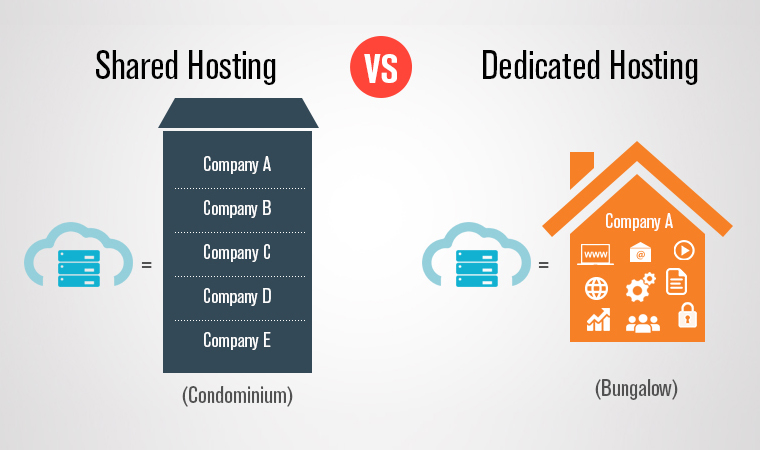Web hosting service is very famous and needed for the websites and many other things. There are three types of web hosting which is VPS hosting, shared hosting and dedicated hosting. However, there are some differences between these type of hosts. So, in this entry, we will show you the shared vs dedicated hosting.
1. Sites on the Server
First, sites on the server. There are other organisations hosting their locations on the server with a shared hosting package right next to your organisation. A dedicated hosting plan imply that the only user hosted on the server is your organization.
2. Bandwidth & Disk Space
Next, with shared hosting, as there are others sharing the server, it limits the amount of disk space and bandwidth you are allocated. Then, if you exceed your allocated amount of bandwidth, they will be charge more and penalize you if you exceed your disk space as a utility. Even if you have bought funds reasonably, some hosts will add additional guidelines to penalize you for possessing items.
Bandwidth and disk space are entirely dedicated to your organization and its server with dedicated hosting. In that case, there is no sharing of resources, very limits on the amount of disk space and bandwidth are up to the requirements of your organization.
3. Costs
With shared hosting, multiple users share the server’s resources so that they split operating costs among customers. This makes hosting shared more affordable and perfect for smaller organisations or companies that are just starting to create their internet presence. Because only one user is dedicated to a dedicated server, it costs more. There’s a advantage, though! You have much more operational flexibility with a dedicated server to handle traffic spikes, customize your server or install specific software to suit your needs.

4. Require Expertise
Your organization does not need a staff with specialized technical skills with shared hosting. The shared hosting provider manages maintenance, administration and security. This simplifies the server’s operation dramatically. The trade off is that it restricts your organisation can do what. Your organisation should expect the need for IT & webmaster skills to set up, install, maintain and handle the general health of the server with your own dedicated server. If, due to time or money constraints, this is too daunting for your organization, but you still need the power and space of a dedicated server, fully managed dedicated hosting plans are available at higher cost. Co-located dedicated servers are cheaper than fully managed dedicated hosting plans. However, it’s important to understand that the cost of managed services is typically still far less than building, staffing and on boarding your own IT department.
5. Security

The hosting company installs firewalls, server security applications and programs with shared hosting. Then, security experts are assigned with providing organisations with a secure and stable operating environment on shared servers. It will be the responsibility of your organization to secure a dedicated server. Your IT department is responsible for setting up software to detect and mitigate threats, while your hosting business is solely liable for keeping your server powered and physically secure.
Your IT team will be able to control the security programs you are installing on a dedicated server. However, as your organization is the only user, due to poor neighbors and incorrectly configured security, there are fewer chances to acquire viruses, malware and spyware.
6. Website & IP Blacklisting
Shared servers introduce an interesting risk vector. There is a possibility that Google will blacklist your websites and other search engines. Because! Someone else on the server is involve in illegal or discouraged activities like spamming. Bad neighbors on a shared server can blacklist the entire IP address, making it almost invisible to your websites. It is highly unlikely that you will be blacklisted on your own dedicated server. Unless your organisation is involve in unethical or illegal online activities. We don’t really suggest it!
7. Server Performance and Response Time
On shared hosting, unexpected internet traffic bursts could drain the restricted funds of the server’s bandwidth. As a result, reaction times and charging times will be slow, without your own immediate fault frustrating both clients and staff. You’re at the whims of someone else’s clients. What will happen if your neighbor gets famous suddenly? You are stuck in a traffic jam with nowhere to go. However, on a dedicated server, this same traffic jam scenario is highly unlikely. Since you don’t share resources on a dedicated server, when you need it, you can count on your server to be extremely responsive with appropriate bandwidth.
Each web hosting plans have its own benefits. It is depend on how much you need it and it cost. We hope this entry that shows the different of shared vs dedicated hosting can help you to choose the suitable plan on Casbay.




